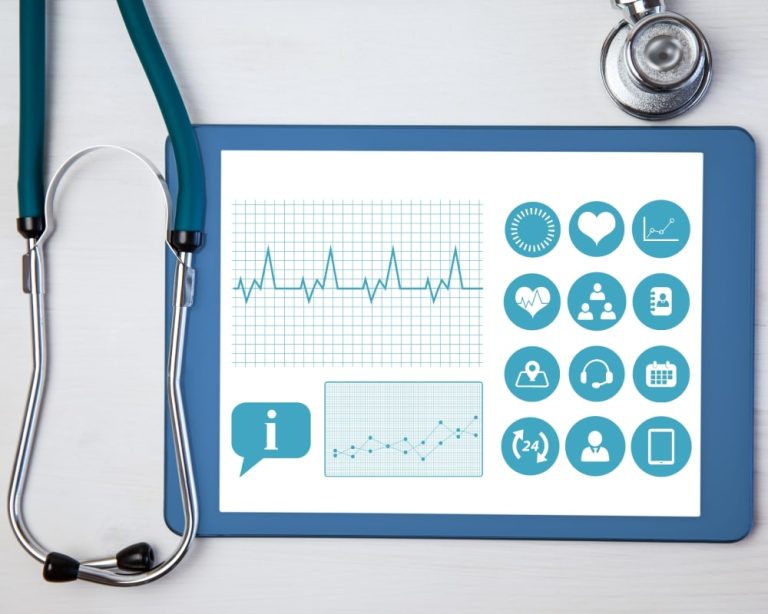May 3, 2023 By: JK Tech
The Healthcare industry is constantly evolving, and it’s crucial to stay up-to-date with the latest trends that will shape the industry in the coming years. According to a report, within a 10-year period, the market for the Internet of medical things (IoMT) is expected to more than quadruple. In 2020, it had a value of less than $40 billion, and by 2030, it is projected to be worth more than $170 billion. In this blog post, we’ll look at the top healthcare trends to monitor in 2023 and beyond.
Digital Transformation
Digital transformation has been a significant trend in the healthcare industry in recent years, and it’s expected to continue to be a driving force in 2023 and beyond. Digital health investments are anticipated to reach $540 billion by 2025, according to a PwC analysis. The integration of digital tools and technologies, such as Electronic Health Records, Telemedicine, and Health Apps, will improve patient outcomes and increase efficiency in healthcare delivery.
Giving patients improved access to care is one of the advantages of digital transformation. The necessity for in-person visits can be eliminated by telemedicine, which enables patients to get medical care from the convenience of their homes. By 2032, it is anticipated that the worldwide telemedicine market would reach $244 billion. Electronic health records (EHRs) also enable healthcare providers to access patient information quickly and easily, improving the quality of care.
Artificial Intelligence (AI) and Machine Learning
Healthcare will significantly benefit from AI and machine learning in 2023 and beyond. According to a report by Forbes, AI is expected to drive $150 billion in annual savings in the healthcare industry by 2026. AI-powered tools can help healthcare professionals in decision-making, diagnostics, and personalized treatments.
Large data sets can be analyzed by machine learning algorithms to find patterns and insights that human therapists would miss. This may result in better treatment strategies and more accurate diagnoses. Virtual assistants and chatbots powered by AI can potentially offer patients individualized care and support, enhancing patient satisfaction.
Cybersecurity
As healthcare organizations become more reliant on digital technologies, cybersecurity is becoming an increasingly critical concern. A report by SelectHub states that the healthcare industry experiences the highest number of data breaches compared to other sectors. To address this issue, healthcare organizations are investing in cybersecurity measures, such as encryption, two-factor authentication, and threat intelligence.
The sheer amount of data that must be secured is one of the main problems affecting healthcare cybersecurity. All of these types of data are valuable targets for cybercriminals, including Electronic Health Records, Patient Data, and Billing Information. Healthcare organizations must adopt a proactive strategy for cybersecurity, which includes educating workers on best practices, putting in place safe access controls, and routinely reviewing and updating security policies.
Personalized Medicine
Personalized medicine is an emerging shift in healthcare that tries to customize therapies to a patient’s unique traits, including genetics, way of life, and environment. According to a report by McKinsey, personalized medicine could represent a $300 billion opportunity by 2025. The increasing availability of genomic data and advances in data analytics and AI make personalized medicine more accessible and affordable.
The ability to analyze large amounts of data allows clinicians to identify the genetic basis of diseases and develop personalized treatment plans. Medical professionals can enhance patient outcomes and mitigate the possibility of negative side effects by customizing therapies for each patient.
Value-Based Care
Value-based care is a method of delivering healthcare that puts an emphasis on patient outcomes while lowering costs through managing chronic illnesses and promoting preventative treatment. By 2025, the global value-based care market is anticipated to reach $24.4 billion, according to a report by MarketResearch.com. The adoption of value-based care models will help healthcare organizations provide high-quality care at lower costs.
Value-based care models incentivize healthcare providers to focus on preventive care and managing chronic conditions, rather than simply treating acute illnesses. By emphasizing preventive care, healthcare providers can reduce the incidence of chronic conditions, leading to better patient outcomes and reduced healthcare costs.
Conclusion
The adoption of digital tools, like AI and machine learning, personalized medicine, cybersecurity, and value-based care will continue to drive the industry forward in 2023 and beyond. In the coming days, the integration of these tools into healthcare services is expected to become even more widespread, providing patients with convenient access to healthcare from the comfort of their own homes. By staying up-to-date with these trends, healthcare professionals can provide better patient care and stay ahead of the competition.
JK Tech is a next-generation Digital and Business consulting provider, committed to transforming the Healthcare and Life Sciences industries through the power of Data, Analytics, and Automation. At JK Tech, we understand the importance of staying ahead of the latest healthcare trends to provide the best services to our clients. We offer healthcare solutions driven by Digital Transformation and AI/ML. Our comprehensive suite of solutions includes Revenue Cycle Management, Automated Compliance, Population Health, and Digital Labs. JK Tech’s healthcare and life sciences solutions enable organizations to achieve better patient outcomes, increase operational efficiency, and drive growth.



